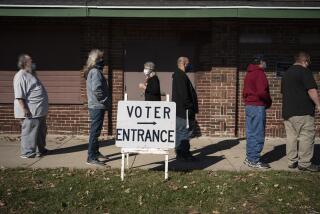Wisconsin recall election opens an uphill battle for Democrats
- Share via
There was a wee dram of good news for Democrats coming out of the Wisconsin recall election Tuesday. While a solid majority of voters chose to retain their Republican governor, Scott Walker, a similar majority told exit pollsters they planned to vote for President Obama in November.
It is small solace, however. Barack Obama carried Wisconsin with 56% of the vote in 2008 and has been expected to recapture the state with no great effort this year. To celebrate a likely victory that was already supposed to be in the bag seems like throwing a party because the sun rose again this morning. Plus, the exit poll result should come with an asterisk. CNN’s John King was a bit befuddled on election night when it turned out that Walker performed much better than exit polls indicated he would. King eventually attributed this statistical glitch to conservative voters who refused to cooperate with pollsters representing the evil liberal news media.
If it was indeed the case that the exit polls skewed left, then arguably Obama could have a bigger challenge in Wisconsin than anyone expects. And that would be more bad news for the Democrats from a state they once could count on.
If I were a Democratic campaign operative or candidate, I’d be very nervous about the drift of politics this year. In Wisconsin, Democrats targeted a rookie governor who had ignited a wildfire of protest when he took on the public employees unions. For months, it looked as if the mighty fist of the workingman was going to come down hard on the governor and several of his fellow union busters in the state Legislature. At least if you were a devoted follower of MSNBC’s lefty pundits, Wisconsin appeared to be the place where the onslaught of tea party conservatism was going to be halted.
Instead, the people power of the unions proved to be no match for the tidal wave of unlimited campaign spending by conservative billionaires. And now, in House and Senate races all over the country, Democratic incumbents are facing the same tsunami of corporate dollars. The conservative “super PACs” are buying endless hours of attack ads that Democrats cannot answer because they do not have the money to match.
For a long time, the Republican advantage in raising cash from rich donors was balanced by the swarm of union members doing field work for Democrats and by the many corporate lobbyists who covered their bets by contributing fairly generously to Democrats with whom they expected to do business in the committee rooms of Congress. Now that has changed. The corporations and big-money guys are dispensing with the even hand. They are giving much less to Democrats and much more to Republicans. And the much more they are giving is a whole bunch of much more, thanks to Citizens United, the U.S. Supreme Court ruling that tossed out limits on campaign contributions.
Add to Democratic troubles the unions’ long slide to marginalization. Union membership is a fraction of what it was half a century ago. The Big Bad Labor Unions are a straw man useful only as a target for Republican TV ads.
Democrats do have a few things going for them. For one, they are more popular than Republicans with the two demographic groups that are going to sway American politics in the years to come: young people and Latinos. So, there may indeed be a rosier future for Democrats -- but that future has not yet arrived. Right now, young people and Latinos fail to vote in numbers that reflect their potential power. The people who are reliable voters are old and white – the core of the Republican constituency.
Another apparent advantage is that more people call themselves Democrats than Republicans and more independents lean toward the Democratic Party than toward the GOP. But this advantage, too, is a bit of a mirage. Thanks to gerrymandering of congressional districts and the small-state bias of the electoral college, the system tilts toward Republicans just enough to make a big difference in close races.
The Democrats’ biggest plus factor is having a president who, apart from the cabal of “birthers” and apocalyptic Bible thumpers, is seen by most Americans as a nice guy with a swell family. Still, as with every other seeming advantage, there is an offsetting phenomenon that favors Republicans. For the president, the undertow that could drown him is the same one James Carville identified so concisely in 1992: “It’s the economy, stupid.”
By the calendar, the election is still months away, but when it comes to counteracting the Republican Party’s formidable systemic advantages, Democrats may have already run out of time.
More to Read
A cure for the common opinion
Get thought-provoking perspectives with our weekly newsletter.
You may occasionally receive promotional content from the Los Angeles Times.










